The Dance Floor That Reads Like a Comic: Digging Into The Wicked + The Divine Vol. 2: Fandemonium
The team behind The Wicked + The Divine are monsters.
I really mean that.
If you read the comic, you know what’s up, but this second volume of the Image Comics hit confirms once and for all that Kieron Gillen, Jamie McKelvie, Matt Wilson, Clayton Cowles and the rest of the fine creators who worked on the book are downright dastardly. Their comic is so devastating at times that retailers stock the book next to boxes of tissue. Boxes of tissue! Their evil truly knows no bounds.
The worst trick of all is they deceive us by acting like angels. They deliver their misery through a book that is one of the finest examples of exquisite craftsmanship and visual storytelling in comics today, and the second volume – Fandemonium – that dropped yesterday finds the team taking their story of literal rock gods to eleven (which works doubly, as the eleventh issue is the final chapter in the trade).
This latest volume comes on the heels of the events of The Faust Act, with series lead Laura investigating the actions that led to the death of Lucifer, her BFF and one of the aforementioned enormously popular and influential gods that make up much of the book’s cast. It is in pretty much every way bigger than the first volume, with a larger ensemble, a broader story and a deeper look at the mythology and rules of this latest pantheon at the center of WicDiv’s universe. Because of that, it also reads better, with the creators growing increasingly confident in this world as it has progressed and opened up.
That confidence is palpable in the storytelling. Part of that comes from the comfort the creatives have in working with each other, as the team in whole has partnered since Young Avengers at Marvel, and Gillen, McKelvie and Wilson much further back than that. These creators have a big idea here, and they know what it takes to bring the best work out in one another.
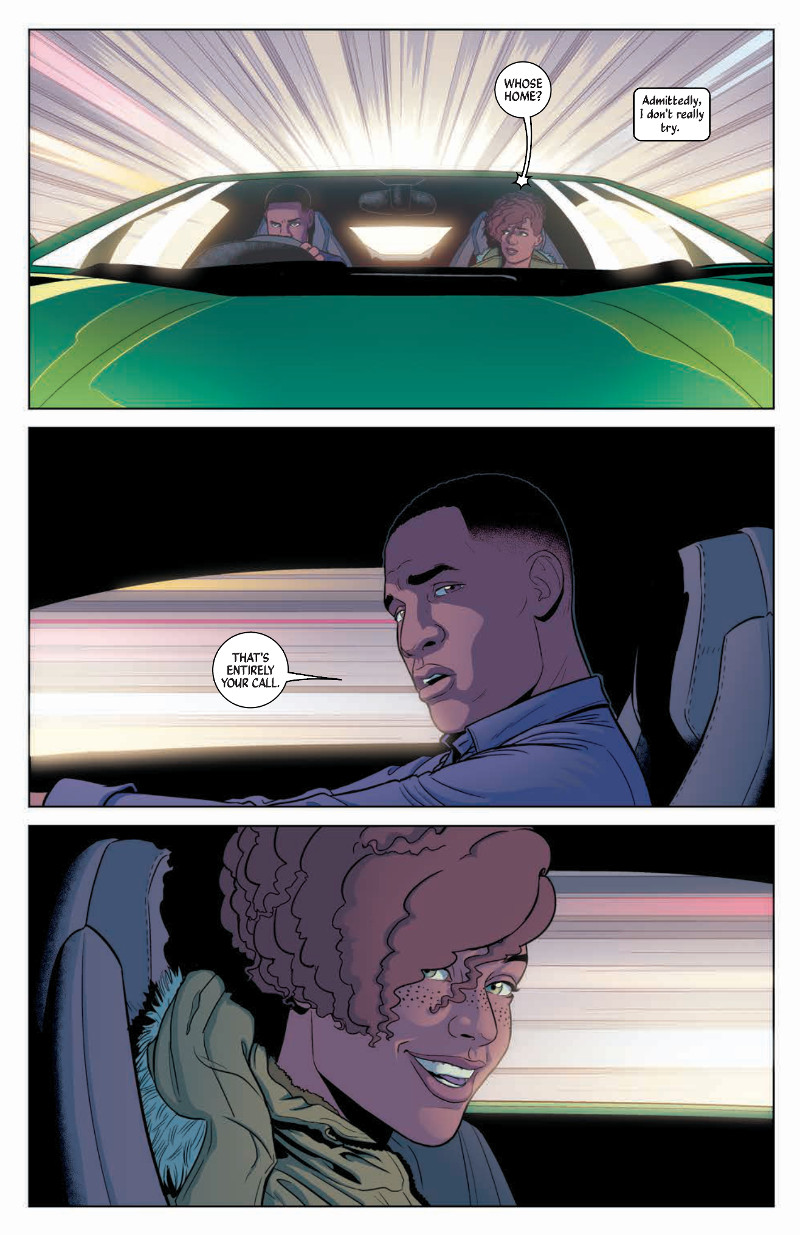 But a bigger part of why this book works as well as it does is the relatable nature of the story. Not that we all know what it’s like to be superpowered young model types, but we all know what it’s like to be young. To be a fan. To be disappointed in your lot in life and to feel like no one really understands what is really going in this world. To feel the weight of life’s temporary nature. Those are universal experiences, and elements that are omnipresent throughout this volume. The Wicked + The Divine could just be a cool book, but its efforts to be a human one are what it make it work as well as it does.
But a bigger part of why this book works as well as it does is the relatable nature of the story. Not that we all know what it’s like to be superpowered young model types, but we all know what it’s like to be young. To be a fan. To be disappointed in your lot in life and to feel like no one really understands what is really going in this world. To feel the weight of life’s temporary nature. Those are universal experiences, and elements that are omnipresent throughout this volume. The Wicked + The Divine could just be a cool book, but its efforts to be a human one are what it make it work as well as it does.
The art team does a remarkable job imbuing the story with those emotions and many more. McKelvie’s always been gifted with the micro elements of visual storytelling – the mannerisms, the realistic gestures, the acting in the art – and you can see that in the page to the left. That confidence the creative team has in one another is there, as they know when words are necessary and when a simple reaction in the face of a character can say so much more. I love Laura’s face in that page, knowing that in that moment everything is up to her. This book is filled with those type of little, fleeting expressions. While they’re small, they’re invaluable to keeping us in this world. Really, I could probably have skipped words in this review and went Buzzfeed style, simply posting a litany of character moments that show why this book is so good. But it’s more than just moments.
That said, ones like this are pretty, pretty cool.
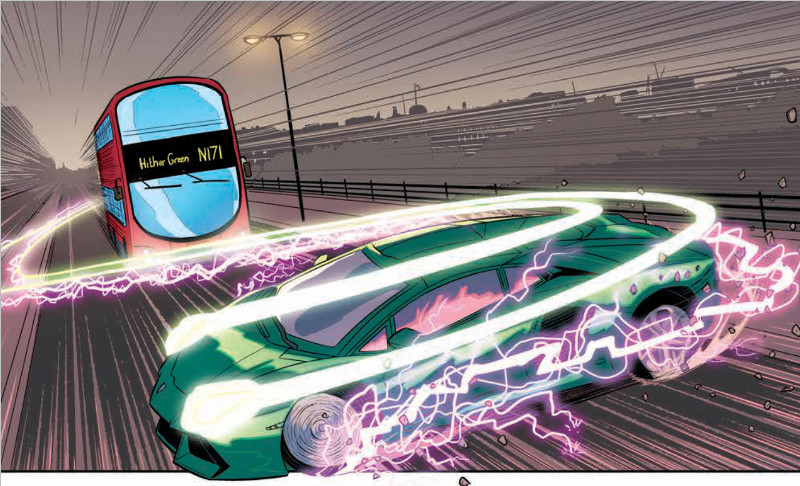
Panels like that are a big reason why Wilson is nominated for an Eisner this year. I’ve said before that Dave Stewart owns a certain shade of red – the hellish color of blood we see so often in and around the Mignolaverse – but if Stewart owns red, then the WicDiv iteration of Wilson owns the neon version of every color. Wilson’s coloring crackles on the page, and in moments like this one, he helps ensure that this is a book that looks like nothing else on the stands. The energy on the page is transcendent, and McKelvie and Wilson bring the most out in each other in moments both big and small. That’s not to say Wilson’s work on this is all about the flash – Wilson’s much more than that, and he is a big part of the natural weight this book needs – but the pop nature of this book is such an important element that it is reliant on Wilson’s ability to make things like that work. He does in spades.
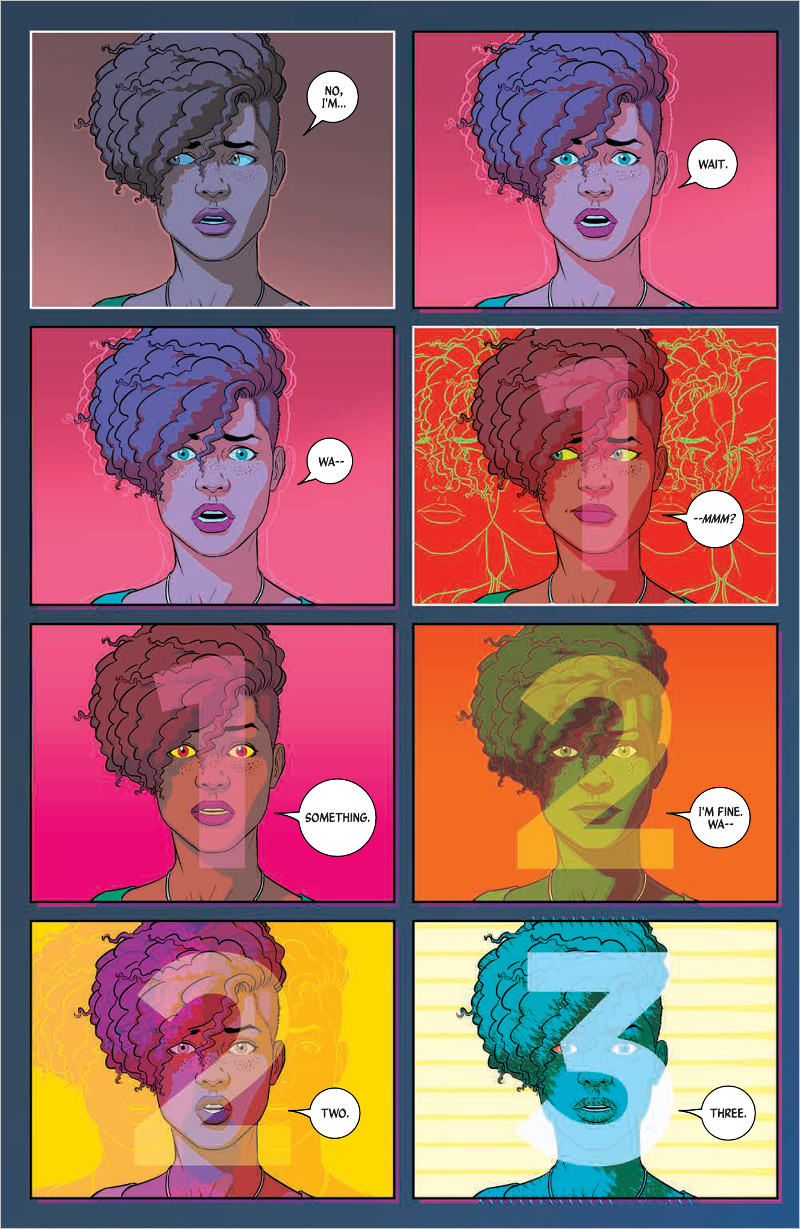 One thing I really like is how the team perpetually challenges itself and readers to approach a story in different ways. In the back of this collection, there is an excellent Making Of section that walks through some of the challenges that come with the development of this collection. Issue 8, which utilized the grid structure you can see, was said to have “(come) close to killing everyone”, with Gillen resorting to manual tactics to showcase how the setup could – and eventually did – work. If you’re a fan of process, there is some small but excellent insight into how this team problem solves together here. It’s a nice little bonus for those who read trades on top of singles or trade wait (as is the gorgeous production on the trade, bravo Hannah Donovan!).
One thing I really like is how the team perpetually challenges itself and readers to approach a story in different ways. In the back of this collection, there is an excellent Making Of section that walks through some of the challenges that come with the development of this collection. Issue 8, which utilized the grid structure you can see, was said to have “(come) close to killing everyone”, with Gillen resorting to manual tactics to showcase how the setup could – and eventually did – work. If you’re a fan of process, there is some small but excellent insight into how this team problem solves together here. It’s a nice little bonus for those who read trades on top of singles or trade wait (as is the gorgeous production on the trade, bravo Hannah Donovan!).
Another great instance you can find of the team really going outside the box is the black and white page below that is from Urðr’s first performance. It’s a stunning moment that cuts deep, just like the lyrics from the performance. Like the audience in the scene, it pierces us straight in the heart. I would have loved to have seen some process work on that piece, but it is a great showcase of how striking the actual performances from the pantheon can be. This section leads to one of the most heart wrenching moments of this volume – Urðr’s devastation to the reaction to her first performance – that also underlines how important it is having a character who actually understands these gods and what they’re all about. She’s a big part of what makes this book as good as it is. I’m of course speaking about Laura, the series lead.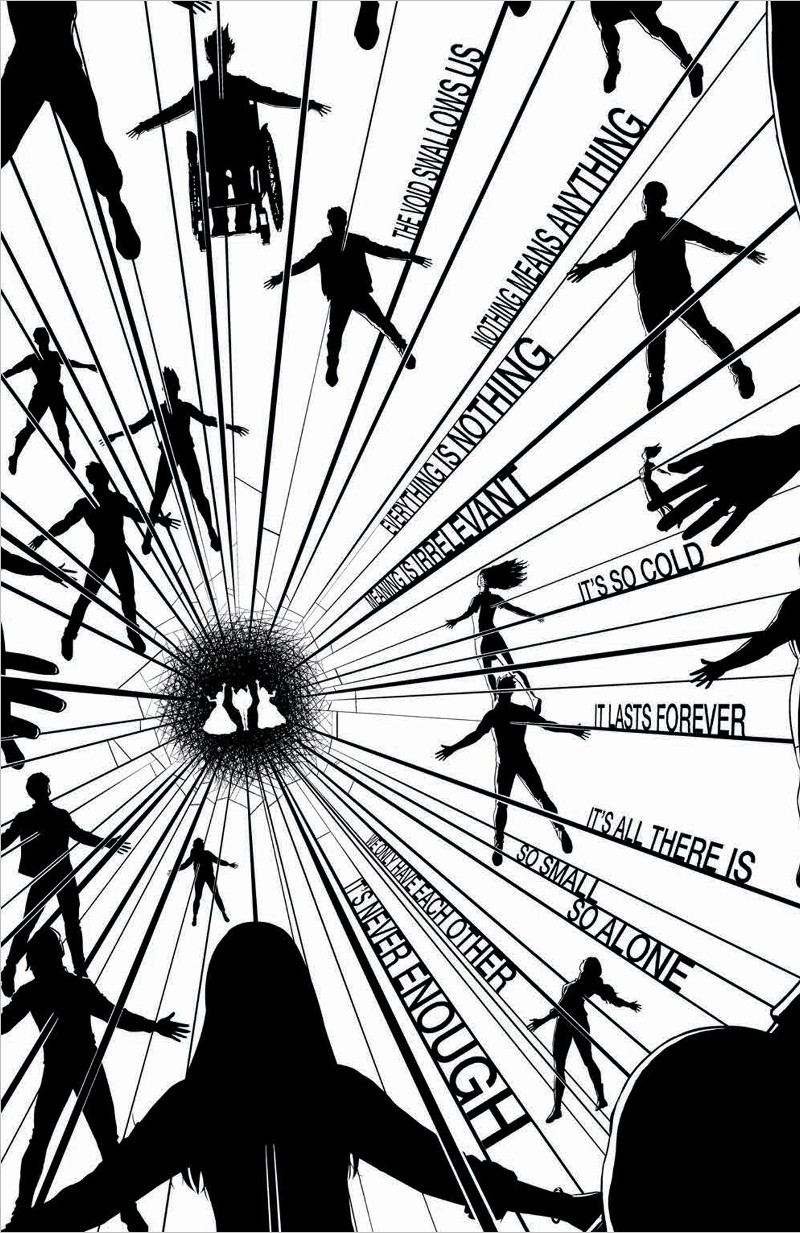
As far as reader stand-ins go, Laura’s one of the best. Gillen delivers her as that fan that we all know and have seen before. The one who pulled back the curtain and found the world wanting, yet – as she says herself – still desires the feelings she once had when she was just a simple fan and not someone in the know. More than anything, Laura wants to be one of the gods, but the bitter disappointment of losing the one she cared the most about paired with the knowledge that all she’d get for her efforts were calluses jaded her. In sections of the book like issue #7 where Laura herself goes to the London Fantheon – think of that as a Comic Con for the pop gods of this world – we get some insight into why she feels the way she does. She’s seen the darker side of these once heroes and those who worship them, and she has found the experience disappointing and frustrating at times.
As a study of fandom – not just in music, as these experiences could stand in for comics, movies, TV, video games, etc. – The Wicked + The Divine is scathing. Not just in how the fans act, but in how those with the power do. Woden – the god of French electronic music, I think – showcases this better than anyone, as he’s a cruel, abusive god at least in part because of that power. But he’s not the only one who shows off the reprehensible things that can come from people with the upper hand. Laura, again, is a perfect stand-in for us, seeing through that bullshit and calling characters out in a way we all would love to. One of the most interesting dynamics in this book is what spins off of Laura. She wants to be part of the pantheon, but characters like Inanna and Baal either envy or favor her because of her ability to deliver herself in godly fashion without having the short lifespan that makes their lives tragic ones.
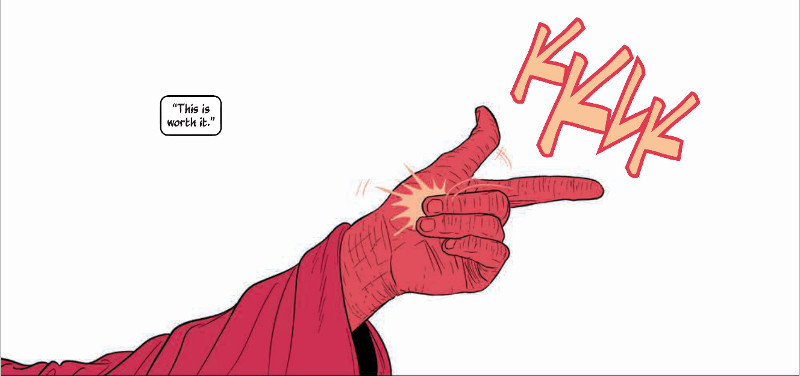
But in a snap, everything changes. To paraphrase the most loathed character in Game of Thrones, if you think this book has a happy ending, you haven’t been paying attention. At its core, Fandemonium is all about the little wins that come right before tearing your heart out. It’s a dark book, and one whose darkness pervades through the glitz and glamor of the latest iteration of the biggest stars in the world. But the only reason these things matter as much as they do is because of the work the team does to make us care so deeply for these characters. The heartbreak and anger and wonder and emptiness and pleasure Laura feels means something because they make us understand her. They make us see ourselves in her. They make us realize that even the gods who are more dance floor than man have more to them than being the eternal life of the party, and it’s why The Wicked + The Divine Vol. 2 works as well as it does.
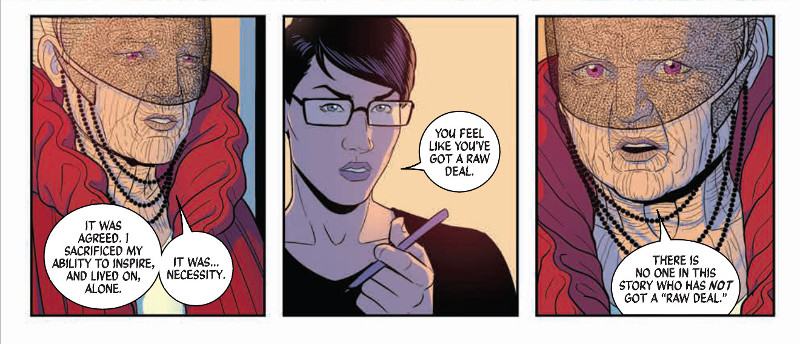
When Ananke said the line in the final panel above, she meant it about the gods themselves. Sure, her situation is less than ideal, but the gods? They’re destined to die after two years of living life at the apex. They burn bright and then they burn out. But really, Ananke’s line could be about everyone in the story, and I wonder if that’s what Gillen really meant. Everyone whose lives are touched by these gods are changed forever, but after two years there will always be a hollowness to them that nothing will fill, or at least until another recurrence hits. That moment of pure joy and passion that one gets from being a fan so deeply that it means everything will be absent. Once it’s gone, what are you left with? Heartache, and a memory of things as they once were.
As readers, we’re left with a similar feeling at the end of our experience reading this volume. Will things ever be the same again? Probably not. But like the fans of this pantheon and the ones before it, we’re just going to have to live with it, and press on like things are the same. It’s a credit to their gifts as creators that Gillen, McKelvie, Wilson, Cowles, et al. are able to give us something that so effectively destroys us yet keeps us coming back for more. The curses of fandom explored in a meta way, I suppose.
Like I said before, though, they’re monsters. I stand by that.
Now off to read issue #12.
All art above from the second volume of The Wicked + The Divine by Jamie McKelvie and Matt Wilson, with letters by Clayton Cowles and words by Kieron Gillen.
